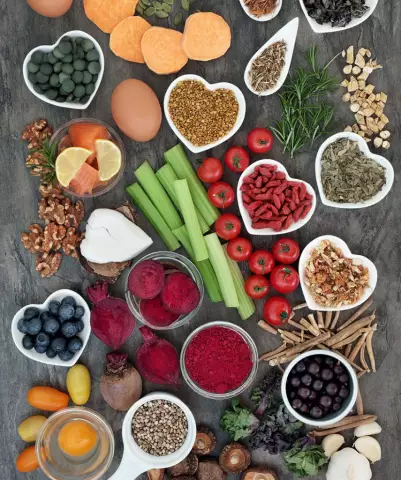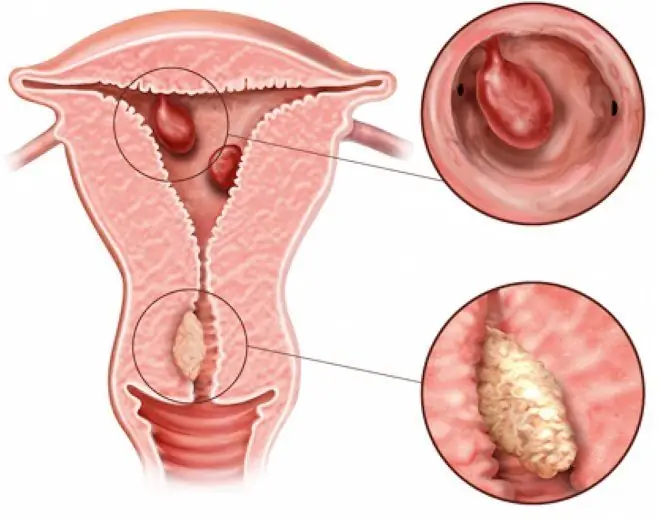- Author Rachel Wainwright wainwright@abchealthonline.com.
- Public 2023-12-15 07:39.
- Last modified 2025-11-02 20:14.
Diet after removal of the gallbladder

Diet after removal of the gallbladder is a therapeutic nutritional complex, the observance of which helps the body to recover faster after surgery. After the operation to remove the gallbladder, a diet is necessary to restore the function of bile secretion and metabolism in the body in the shortest possible time.
Diet menu after removal of the gallbladder
The first 2-3 days after surgery, patients usually do not feel hungry. Anesthesia can cause nausea and, as a rule, it is recommended not even to drink water for the first 4 hours after the operation and until the end of the day just rinse your mouth with not sweet herbal infusions. The next day, when the anesthesia is completely removed from the body, it is allowed to consume no more than 1 liter per day of water and herbal infusions.
After 36 hours after the operation, the water can be replaced with dried fruit compotes, weak tea without sugar and 0% kefir. It is necessary to drink 150-200 ml of any of the above liquids every 3-3.5 hours, but the total amount drunk should not exceed 1.5 liters per day.
On the third and fourth days, the diet menu after removal of the gallbladder expands significantly, food is already added to it, such as:
- Mashed potatoes;
- Freshly squeezed apple, pumpkin and beetroot juices;
- Mashed soups based on light broth or water;
- Boiled fish;
- Protein omelet;
- Fruit jelly;
- Tea with a little sugar.
It is important to remember that one serving should not exceed 200-250 g 3-4 times a day.
White bread, biscuits and crackers without spices are added to the diet of the fifth day in an amount not exceeding 100 g per day, and on the 6th day you can already eat oatmeal and buckwheat milk porridge, boiled meat, low-fat cottage cheese and dairy products.
After a week of a strict diet, a gentle diet comes into force, which lasts 1.5 months. It is important during this period to remember that meals should be in small portions 6 times a day, and all food should be boiled or steamed. The diet menu after removal of the gallbladder for this period includes:
- Boiled fish and meat;
- Protein omelets;
- Steamed meatballs, meatballs and cutlets;
- Vegetable purees (potato and squash);
- Fruit jelly;
- Vegetable soups;
- Freshly squeezed juices;
- Vegetable stew;
- Pureed milk porridge;
- Curd puddings.
After a month and a half following the diet, after removing the gallbladder, you can switch to a general diet, the menu of which includes rabbit, chicken, lean veal or beef, vegetables and fruits, one boiled egg per week, salads with vegetable oil or low-fat sour cream, porridge, boiled sausage without lard, vinaigrette, homemade milk and vegetable soups.

Sharp, pickled, salted, smoked, fried, sweet, spicy and canned foods (with the exception of fruits), as well as alcohol, lamb, fatty sausages, pork, goose, duck and cocoa are strictly prohibited when following a diet after removing the gallbladder.
The diet after removal of the gallbladder should be followed strictly point by point, as this directly affects the duration of the recovery period. After the recovery period, you can usually fully return to your normal diet with few restrictions on fatty foods.
Consequences of gallbladder removal surgery
After the gallbladder is removed, some patients have frequent loose watery stools, which are characterized as diarrhea. In most cases, it lasts from several weeks to several months. Diarrhea after removal of the gallbladder is associated with the release of bile directly into the intestines. Usually the gallbladder collects and concentrates bile, but after surgery, bile drains continuously into the intestines, where it causes a laxative effect and affects the digestion of fats and fat-soluble vitamins.
After having had gallbladder removal surgery, diet and the following tips can help minimize diarrhea problems:
- Limiting the use of fatty foods. It is necessary to completely eliminate fatty foods, fried foods, fatty sauces and gravies, replacing them with low-fat foods, steamed, boiled or baked;
- Increasing the amount of fiber in your daily diet, which can help normalize bowel movements. However, the process should be slow, over several weeks, because too much fiber can initially lead to gas in the intestines;
- It is important to remember that more frequent and smaller portions of food are more beneficial for the body as a whole and are necessary when following a diet after gallbladder surgery. A healthy diet should include small amounts of lean protein (lean fish, chicken breast, turkey meat), as well as vegetables, fruits, and whole grains.
It is also necessary to limit the consumption of foods that can aggravate diarrhea, which include:
- Caffeine;
- Fatty dairy products;
- Fatty food;
- Sweets.
If loose stools persist and become more frequent, or a sudden weight loss begins and a feeling of weakness intensifies, then contacting a doctor may, in addition to the diet after gallbladder surgery, prescribe medications such as loperamides (Imodium), which slow down intestinal movement, or reduce laxative effect of cholestyramine bile (Loholest, Prevalin).
Found a mistake in the text? Select it and press Ctrl + Enter.






